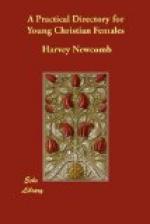an increase of care. “The unmarried woman
careth for the things of the Lord, that she may be
holy both in body and spirit; but she that is married,
careth for the things of the world, how she may please
her husband.” But much more has been made
of this than the apostle intended. It has been
greatly abused and perverted by the church of Rome.
It must be observed that, in the same chapter, he
advises that “every man have his own wife, and
every woman have her own husband.” And,
whatever may be our condition in life, if we seek
it with earnestness and perseverance, in the way of
duty, God will give us grace sufficient for the day.
But he says, though it is no sin to marry, nevertheless,
“such shall have trouble in the flesh.”
It is undoubtedly true, that the enjoyments of conjugal
life have their corresponding difficulties and trials;
and if these are enhanced by an unhappy connection,
the situation is insufferable. For this reason
I would have you avoid the conclusion that marriage
is indispensable to happiness. Single life is
certainly to be preferred to a connection with a person
who will diminish, instead of increasing, your happiness.
However, the remark of the apostle, “such shall
have trouble in the flesh,” doubtless had reference
chiefly to the peculiar troubles of the times, when
Christians were exposed to persecution, the loss of
goods, and even of life itself, for Christ’s
sake; the trials of which would be much greater in
married than in single life.
Having these two principles fixed in your mind, you
will be prepared calmly to consider what qualifications
are requisite in a companion for life. These
I shall divide into two classes: 1. Those
which are indispensable. 2. Those which
are desirable. Of the first class, I see
none which can be dispensed with, without so marring
the character of a man as to render him an unfit associate
for an intelligent Christian lady. But, although
the latter are very important, yet, without possessing
all of them, a person may be an agreeable companion
and a man of real worth.
FIRST CLASS.
1. The first requisite in a companion for life
is piety. I know not how a Christian can form
so intimate a connection as this with one who is living
in rebellion against God. You profess to love
Jesus above every other object; and to forsake all,
that you may follow him. How, then, could you
unite your interest with one who continually rejects
and abuses the object of your soul’s delight?
Indeed, I am at a loss to understand how a union can
be formed between the carnal and the renewed heart.
They are in direct opposition to each other. The
one overflows with love to God; the other is at enmity
against him. How, then, can there be any congeniality
of feeling? Can fire unite with water? A
desire to form such a union must be a dark mark against
any one’s Christian character. The Scriptures
are very clear and decided on this point. The




